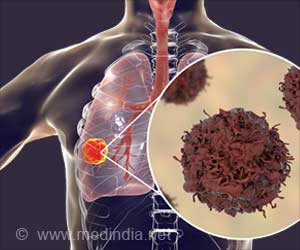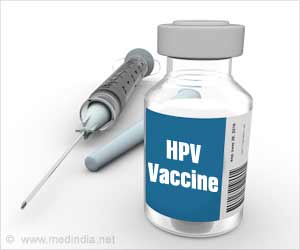
FDA approves alectinib as adjuvant treatment for ALK-positive non-small cell lung cancer
Go to source). This approval is contingent upon the detection of ALK-positive NSCLC in patients, through an FDA-approved test.
The approval was based on the effectiveness of treatment proven in a worldwide, randomized, open-label trial (ALINA, NCT03456076) conducted on patients with ALK-positive NSCLC who underwent a full removal of the tumor.
‘Alectinib-A TKI approved by US FDA for non-small cell lung cancer patients #lungcancer #tumor #medindia’





Advertisement
Alectinib – Type of Molecule and Its Indications
Alectinib is a new-generation tyrosine kinase inhibitor (TKI) and belongs to the group of cancer growth inhibitors.It hinders the advancement of cancer by blocking particular chemical signals that promote cell growth and is indicated as an adjuvant treatment for ALK-positive NSCLC after tumor resection.
Alectinib, among other TKIs, has demonstrated remarkable clinical effectiveness in the treatment of ALK-positive non-small-cell lung cancer (NSCLC), particularly in individuals who have developed resistance to alternative therapies such as crizotinib.
Advertisement
Details of Clinical Trial
The trial was conducted on patients with ALK-positive NSCLC who had undergone a complete removal of the tumor.The patients eligible for the study were those who had Stage IB (tumors measuring 4 cm or larger) to IIIA NSCLC (as per AJCC 7th edition) surgically removable tumors.
The ALK rearrangements were detected either through a locally conducted FDA-approved ALK test or a centrally conducted VENTANA ALK (D5F3) CDx assay.
Following the tumor resection, a total of 257 patients were randomized in a 1:1 ratio to receive either alectinib 600 mg orally twice daily or platinum-based chemotherapy.
Advertisement
Efficacy Endpoint and the Results
The investigator considered the primary efficacy endpoints as disease-free survival (DFS) among patients with stage II-IIIA NSCLC, and DFS in the total study population (stage IB-IIIA).Similar results were seen in the total study population with median DFS not reached in the alectinib arm, while it was 41.3 months in the chemotherapy group.
Adverse Effects Noted During the Trial
Alectinib was found to cause hepatotoxicity, constipation, myalgia, COVID-19, fatigue, rash, and cough in more than 20% of patients.Teams involved in the Approval
The review and approval of alectinib was conducted under the initiative of the FDA Oncology Center of Excellence, as part of Project Orbis. Project Orbis establishes a basis for simultaneous submission and assessment of oncology medications among global collaborators. In this particular assessment, the FDA worked in collaboration with the Australian Therapeutic Goods Administration, Health Canada, Israel’s Ministry of Health, Switzerland’s Swissmedic, and the United Kingdom’s Medicines and Healthcare products Regulatory Agency. The evaluation process is currently underway at other regulatory agencies participating in Project Orbis.Reference:
- FDA approves alectinib as adjuvant treatment for ALK-positive non-small cell lung cancer - (https://www.fda.gov/drugs/resources-information-approved-drugs/fda-approves-alectinib-adjuvant-treatment-alk-positive-non-small-cell-lung-cancer#)
Source-Medindia















